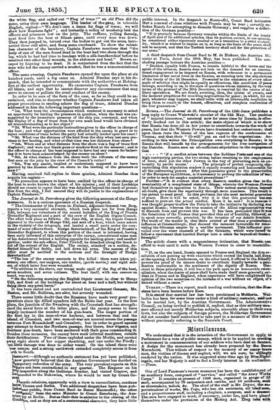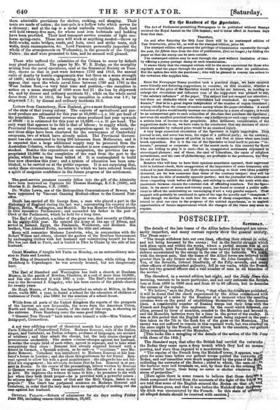Mine Wants.
We understand that it is'tbe intention of. the' Government to apply to Parliament for-a vote of public money, which ia to be applied. in erecting a• monument in commemoration of our soldiers who have died at Scutari. A design for the monument has already been prepared by, the Baron Marochetti. This-tribute of respect' to the memory of set Many brave men, the victims of disease and neglect, will we are enre, be- willingly rendered by the nation. It Was suggested' sometline age. by. Mies:Night- ingale, and her Majesty is said to feel a•liVelyinterest in. Its realization. —Times.
One of Lord Paumure's recent measures has been the establishment of an auxiliary force, composed of " navvies," and called "the Army Werke Corps." It consists at present. of 1000 men, organized in gang& or15 each, accompanied by' 70 carpenters-and. smiths, and 64 artificers', sualt as- shoemakers, tailors, Boa The chief of die staff. is Mr, Doyne; the sue perintendent of works, Mr. Pope, who: has six assistants, all tiled, men, and a proportionate staff, including a chaplain, a surgeon, and. a dresser. The men have engaged•to work, if necessary, under fire,, and have placed themselves under- the provisiuns of the Mutiny Act. They take with
them admirable provisions for shelter, cooking, and sleeping. Their tents are made of cotton ; the tent-pole is a hollow tube which serves for a chimney ; and at the top is a metal umbrella ventilator. Each tent will hold twenty-five men, for whom neat iron bedsteads and bedding have been provided. Their land transport service consists of light one- horse spring-carts. These men will work at anything needed—throw up field-works, make bridges, roads, and buts, erect and strike tents, sink wells, drain encampments, &c. Lord Panmure personally inspected the whole of the arrangements on Wednesday, in the grounds of the Crystal Palace : the staff were presented to him, and he seemed well pleased.
Those whO suffered the calamities of the Crimea to occur by default may plead precedent. The paper by Mr. W. B. Hodge, on the mortality arising from the naval operations, read at the Statistical Society on Tues- day, shows us that in past wars between 1793 and 1815, the annual ratio of deaths by hostile engagements was but three on a mean strength of 1000; while by wrecks, or burning, it was only six. Again, it would appear that upon the whole naval force between 1780 and 1782 in the West Indian fleet,—a very fatal time and position,—the casualties in action on a mean strength of 1000 were but 21 : the loss by shipwreck 54, and by disease and ordinary accidents 55 ; while on the whole naval force from 1810 to 1812, the loss by casualties in action was 1.9 ; by shipwreck 7.3; by disease and ordinary incidents 35.3.
Letters from Canterbury, New Zealand, give a most flourishing account of the state of that young colony. The exports of agricultural and pas- toral produce are estimated for this year at 40,000/.-1. e. 10/. per head of the population. The customs' revenue alone produced last year upwards of 9000/. : it is estimated for this year at 12,000/.—i.e. 3/. per head. The only want that appears to be felt is that of labour ; to supply which, the Provincial Government has sent an emigration-agent to this country ; and three ships have been chartered for the conveyance of Canterbury emigrants, two of which have already sailed. The Provincial Govern- ment has also contracted to bring 200 labourers from Melbourne, and it is expected that a large additional supply may be procured from the Australian Colonies, where the labour-market is now comparatively over- stocked. Besides this expenditure on emigration, the province has ap- propriated 10,0001. to the completion of the road from the port to the plains, which has so long been talked of. It is contemplated to build four new churches this year ; and a system of education has been esta- blished, to be carried on at the public expense. It is not surprising that, under these circumstances, the letters to which we have referred breathe a spirit of sanguine confidence in the future progress of the settlement.
The good-service pensions recently fallen into the gift of the Admiralty have been bestowed on Captains Sir Thomas Hastings, K.C.B. (1830), and Charles R. D. Bethune, C.B. (1830).
Dr. Waller Lewis, one of the Metropolitan Commissioners of Sewers, has been appointed by Viscount Canning Medical-officer to the General Post- office.
Death has carried off Sir George Rose, a man who played a part in the diplomacy of England during the last war ; representing his country at the Hague, Berlin, Washington, and Munich. ie was Member for Christchurch in nine successive Parliaments ; and succeeded his father in the post of Clerk of the Parliament, which he held for a long time.
The Earl of Carysfort, a soldier of the great war, died recently at Clifton, in his eighty-fifth year. He entered the Army at the age of fifteen, and served in Ireland, Egypt, the Peninsula, Walcheren, and Holland. His brother, Vice-Admiral Proby, succeeds to the title and estates.
Many will remember Madame Lavalette, who, in conjunction with Sir Robert Wilson and others, cheated the gaolers of the Bourbon Government by exchanging clothes with her husband and substituting herself for him. She has just died in Paris, and is buried in Pare la Chaise by the side of her husband.
Count Massimo d'Azeglio left Turin on Monday, on an extraordinary mis- sion to Paris and London.
The King of Denmark has been thrown from his horse, while riding from Skodsborg to Copenhagen : he was severely bruised, but not dangerously hurt.
The Earl of Stamford and Warrington has built a church at Dunham Massey, in the parish of Bowdon, Cheshire, at a cost of more than 10,0001., and has also endowed it with 1001. a ear. The Earl's first presentation was to the Reverend J. Kingsley, who has been curate of the parish-church for twenty years.
Sir Hugh Munro, of Emilie, has bequeathed an estate at Milton, in Ross- shire, worth 3001. a year, to found a school for the education of children of tradesmen of Perth; also 1000/. for the erection of a school-house.
While from all parts of the United Kingdom the reports of the prospects of the harvest are now favourable, the news from the American Union, North and South, and from Canada, of the state of the crops, is cheering in the extreme. From Hamburg come the same good tidings.
" General Tom Thumb" hath taken unto himself a wife—Miss Vinton, of Bridgeport, Connecticut.
A not very edifying expose of theatrical morals has taken place at the Paris Tribunal of Correctional Police. Madame Ronconi, wife of the Italian singer, and Cattabeni, an Italian refugee, professor of languages, are accused of adultery ; and they admit the charge, but the lady denies charges of promiscuous unchastity. She makes counter-charges against her husband. It seems the couple tired of each other, agreed to separate, and to take what companions they chose : Ronconi had already supplied himself with a friend in Carmen, a Spanish actress, as he said—a " courtesan " says Ma- dame Ronconi. Cattabeni was introduced to Madame Roncoui at her hus- band's house in London ; and she chose this gentleman for her friend. Ron- coni agreed to allow his wife a good maintenance : she alleges he has not ful- filled his engagement ; his advocate declares that he has. Ronconi is at pre- sent in Russia. In the course of the proceedings, letters written by Ronconi to Carmen were put in. They are apparently the effusions of a man madly in love. He implores the woman to come to him ; he promises to die with her when they both think proper—he is provided with a powerful poison ; he adjurea her—" in the name of God and the Holy Virgin, listen to my prayers !" The Court has postponed sentence on Madame Ronconi and Cattabeni, in order that the lady may have an opportunity of making out the case against her husband.
CRYST.U. PALACE.—Return of admissions for six days ending Friday June 22d, including season-ticket-holders, 53,657.



































 Previous page
Previous page